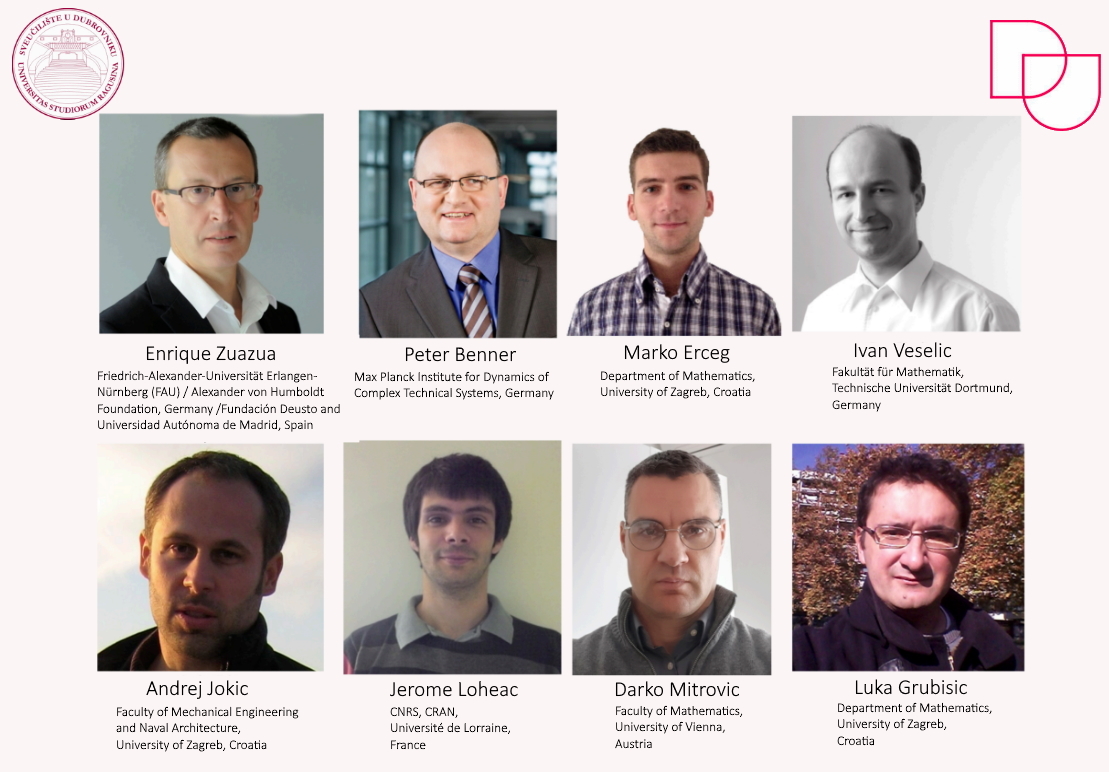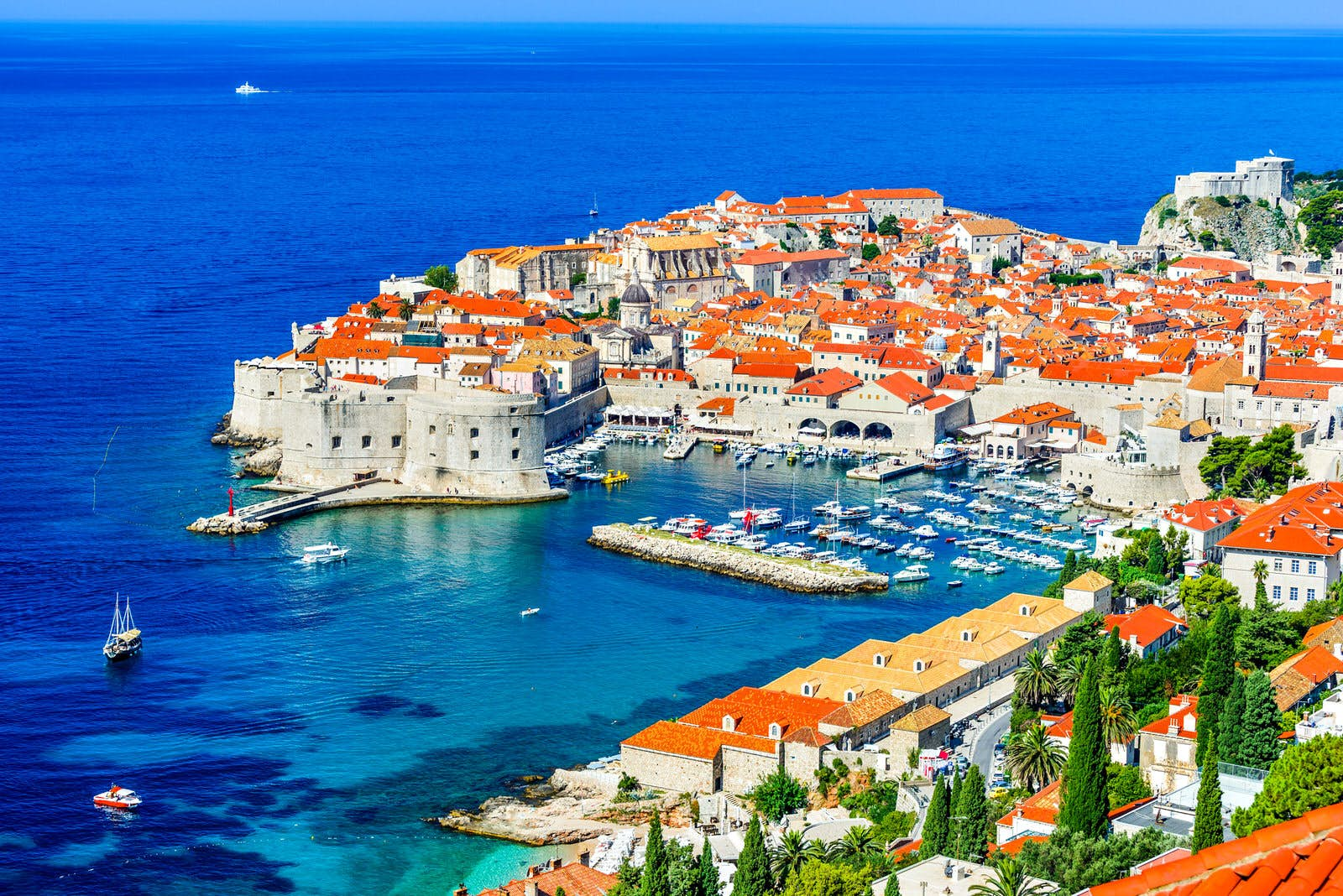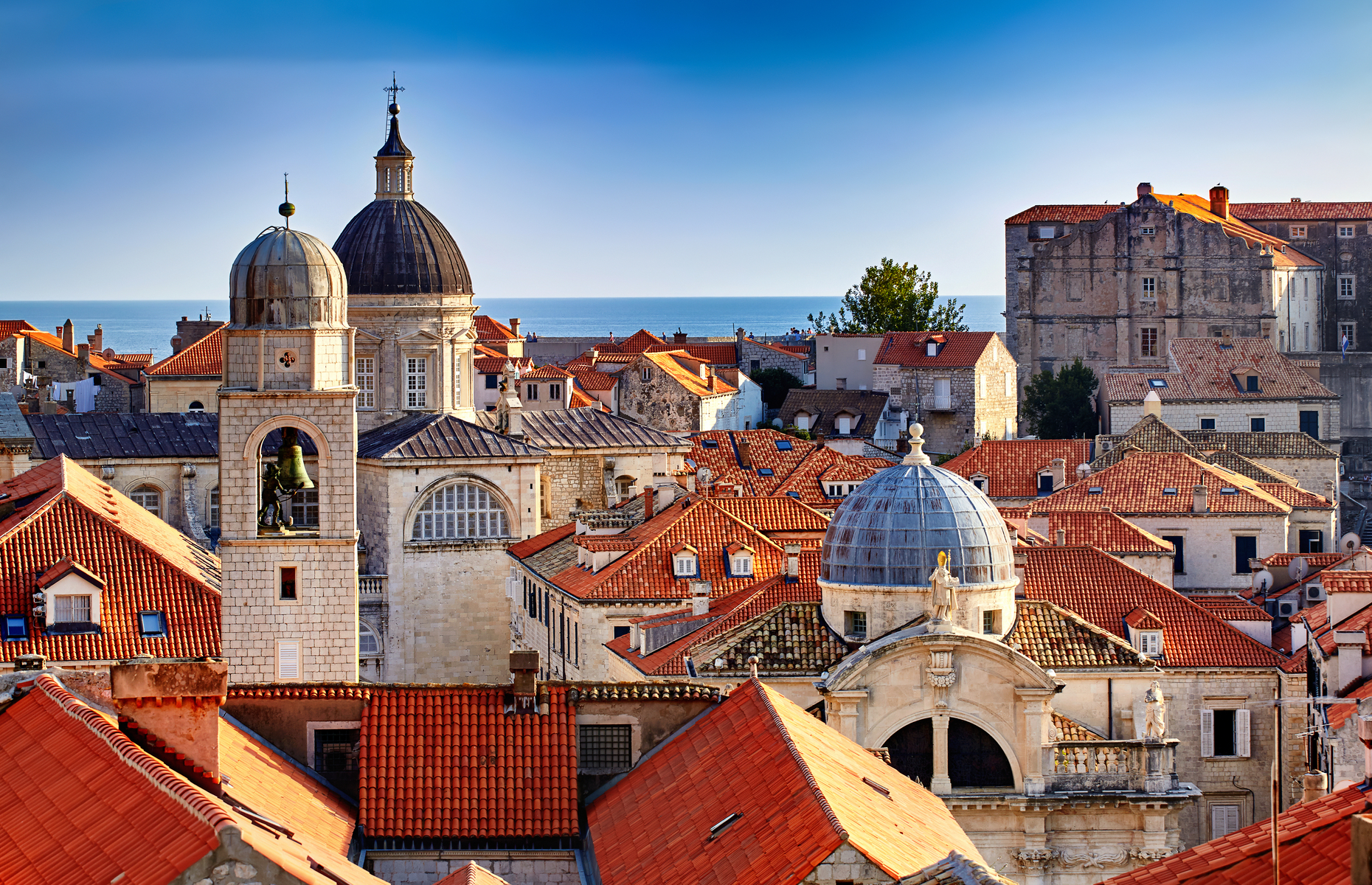Workshop on Control of Dynamical Systems
14-16 June 2021
Dubrovnik, Croatia
Dear Colleagues,
we would like to invite you to take part in the Workshop on Control of Dynamical Systems, to be held during June 14-16, 2021 in Dubrovnik, Croatia.
The idea of the workshop is to share the most recent results and trends in control theory and its applications.
The workshop is organized within the framework of the project Control of Dynamical Systems sponsored by Croatian Science Foundation.
For the online participation please use the following Zoom invitation.
Join Zoom Meeting
https://us02web.zoom.us/j/6567889333?pwd=Zjl0WndBZ001a25XazloSEFZaUFYQT09
Meeting ID: 656 788 9333
Passcode: UNIDU
You are welcome to pass this invitation to any colleagues who might be interested in this event.
Registration
All the participants are required to register via Registration and abstract submission form.The deadline for the registration is June 1.
For all inquiries please use the e-mail address:
REGISTRATION FEE INFORMATION
Live participation: 100 EUR -750 HRK (VAT INCLUDED)
Online participation (with a presentation): 70 EUR – 500 HRK (VAT INCLUDED)
INSTRUCTIONS FOR FEE PAYMENT
Details of bank account:
*Beneficiary: Sveučilište u Dubrovniku:
Address: Branitelja Dubrovnika 29, Dubrovnik, Croatia
Telephone number: +385 20 445 925
Bank name: PRIVREDNA BANKA ZAGREB, CROATIA
Branch address: PBZ Zagreb
Radnička cesta 50
Tel: + 385 01 6360000
Payments (in €) to be made to the following account number:
Account No: IBAN: HR08 2340 0091 1101 3501 5
Call to account number: 31-20-144
SWIFT Number: PB ZG HR 2X
VAT number HR01338491514
*we kindly ask you to insert in your payment description: ConDyS Workshop 2021.
Payments (in HRK) to be made to the following:
Account number: IBAN: HR08 2340 0091 1101 3501 5 (Privredna banka Zagreb)
Call to account number: 31-20-144
*we kindly ask you to insert in your payment description: ConDyS Workshop 2021.
Please note that a confirmation of your payment (a copy of your Conference Fee payment slip)
is required. You are kindly requested to submit this copy to us in scanned form by
e-mail to:
Travel and accommodation
Covid19 information:
Travellers (regardless of their citizenship) coming directly from EU Member States or Schengen Associated countries and regions that are currently classified as “green” will be allowed entry in Croatia with no restrictions. To check if your country is on the “green” list please check here:
REOPEN EUROPA.
All travelers aged above 7 who, regardless of their citizenship, arrive from countries or regions that are NOT classified as “green”, are subject to the requirement for a pre-departure negative PCR test or rapid antigen test for SARS-CoV-2 listed on the list of Rapid Antigen Tests Mutually Recognized by the Member States of the European Union, published by the European Commission.
All travelers who, regardless of their citizenship, arrive from countries or regions that are NOT classified as “green”, and do not provide a pre-departure negative PCR or rapid antigen test, must remain in quarantine until they receive the result of a PCR or rapid antigen test taken in Croatia. Testing for SARS-CoV-2 is also available at some airports in Croatia:
Split and
Zagreb.
Detailed instructions you can find
here.
It is also strongly recommended that all foreign citizens announce their arrival information
via web form “Enter Croatia”:
https://entercroatia.mup.hr/
Arrival
The Dubrovnik International Airport is well connected to many major cities of the world, either directly or by the international airports in Zagreb and Split.Regular bus service by Platanus Travel buses runs from the airport to the central bus station in Gruž. Buses depart after each scheduled flight arrival, and the ticket costs 55KN (or 7,5 EUR). The drive takes about 30 minutes. On the way buses stop at Pile (at the entrance into the Old City), from where you can take a local city bus (line 6) to the Conference venue, University of Dubrovnik, Department of Electrical Engineering and Computing. Address: Ćira Carića 4, 20000 Dubrovnik.
Buses heading for the airport leave from the central bus station 90 minutes before scheduled Croatia Airlines or Austrian Airlines flight departures, and 120 minutes before scheduled departures of other airlines. They also make one stop near the Old City, next to the cable car station.
You can also take a taxi from the airport (cost €40 approximately).
Additional information about getting by plane:
Dubrovnik airport
Croatia airlines
Accommodation
All participants are expected to make their own accommodation arrangements.We recommend affordable accommodation in a separate building of student dormitory which is located in the center of Dubrovnik, on address Marka Marojice 2b. In the dormitory there would also be a gym, music club, coffee bar etc. Nearby there is a few small shops, supermarkets are situated 10-15 minutes by walking from the dormitory. Website.
Prices:
price per person in double room per day, breakfast included: 285 kn + Tourist tax 20 kn per person per day.
price per person in double room (single use) per day, breakfast included: 473 kn + Tourist tax 20 kn per person per day.
For more information please contact
Below we list few hotels in the nearby area:
https://www.valamar.com/en/hotels-dubrovnik (a resort, with hotels ranging 3-5*)
http://www.grandhotel-park.hr/ (4*)
https://www.hotel-lapad.hr/hr/contact-us/ (4*)
https://www.hotel-ivka.com (3*)
You have also a big variety of private accommodation, which are usually of a good quality.
Croatia traveler-private accommodation
You can also search for them on Booking or AibBnb pages:
Airbnb
Booking
Participants
Invited speakers
Peter Benner. Max Planck Institute for Dynamics of Complex Technical Systems, Germany.
Title: LQResNet: Using DNNs for Learning of Dynamical Systems
(abstract).
Marko Erceg. Department of Mathematics, University of Zagreb, Croatia.
Title: Strong traces to degenerate parabolic equations
(abstract).
Luka Grubišić. Department of Mathematics, University of Zagreb, Croatia.
Title: Rational function surrogate modeling for the optimal control of parabolic systems
(abstract).
Andrej Jokić.
Faculty of Mechanical Engineering and Naval Architecture, University of Zagreb, Croatia.
Title: Market-based power systems: a control perspective
(abstract).
Jérôme Lohéac.
CNRS, CRAN, Université de Lorraine, France.
Title: Some contributions to output controllability
(abstract).
Darko Mitrović.
Faculty of Mathematics, University of Vienna, Austria.
Title: Global Controllability for Quasilinear Non-negative Definite System of ODEs and SDEs
(abstract).
Ivan Veselić.
Fakultät für Mathematik, Technische Universität Dortmund, Germany.
Title: Null controllability for the semigroup of the harmonic oscillator
(abstract).
Enrique Zuazua.
Friedrich-Alexander-Universität Erlangen-Nürnberg (FAU) / Alexander von Humboldt Foundation, Germany
/Fundación Deusto and Universidad Autónoma de Madrid, Spain.
Title: Dynamics and control of a guiding model
(abstract).
Schedule and abstracts
Full program and abstracts are available in the Book of abstracts as download.Schedule
14th June
| Time (CET) | Speaker | Talk titles |
|---|---|---|
| Session 1 – Chair: Ivica Nakić | ||
| 08:50-09:00 | Opening | |
| 09:00-09:45 | Ivan Veselić | Null controllability for the semigroup of the harmonic oscillator |
| 09:45-10:15 | Martin Lazar | Greedy Algorithm for Parameter Dependent Operator Lyapunov Equations. Application to Control Problems |
| 10:15-10:45 | Coffee break | |
| 10:45-11:30 | Enrique Zuazua | Dynamics and control of a guiding model |
| 11:30-12:00 | Cristhian Montoya | Robust control and Stackelberg strategy for a fourth–order parabolic equation |
| Session 2 – Chair: Ivana Palunko | ||
| 15:00-15:45 | Jérôme Lohéac | Some contributions to output controllability |
| 15:45-16:15 | Domagoj Tolic | Stabilizing Transmission Intervals and Delays in Nonlinear Networked Control Systems through Hybrid-System-with-Memory Modeling and Lyapunov-Krasovskii Arguments |
| 16:15-16:45 | Coffee break | |
| 16:45-17:15 | Ivica Nakić | H∞ analysis of cooperative multi-agent systems |
| 17:15-17:45 | Zoran Tomljanović | Optimal damping of vibrational systems using finite time energy criterion |
15th June
| Time (CET) | Speaker | Talk titles |
|---|---|---|
| Session 1 – Chair: Luka Grubišić | ||
| 09:00-09:45 | Peter Benner | LQResNet: Using DNNs for Learning of Dynamical Systems |
| 09:45-10:30 | Andrej Jokić | Market-based power systems: a control perspective |
| 10:30-11:00 | Coffee break | |
| 11:00-11:30 | Ivana Palunko | Learning near-optimal broadcasting intervals in decentralized multi-agent systems using online |
| 11:30-12:00 | Domagoj Lacmanović | Automatic mesh generation for the low order dynamical analysis of marine structures |
| Session 2 – Chair: Zoran Tomljanović | ||
| 15:00-15:45 | Luka Grubišić | Rational function surrogate modeling for the optimal control of parabolic systems |
| 15:45-16:15 | Ninoslav Truhar | Damping Optimization in Mechanical Systems-New Perspectives |
| 16:15-16:45 | Coffee break | |
| 16:45-17:15 | Matea Ugrica | Fast optimization of viscosities for frequency-weighted damping of second-order systems |
| 17:15-17:45 | Suzana Miodragović | Frequency isolation problem for hyperbolic QEP |
| 20:30 | Workshop dinner | |
16th June
| Time (CET) | Speaker | Talk titles |
|---|---|---|
| Session 1 – Chair: Martin Lazar | ||
| 09:00-09:45 | Darko Mitrović | Global Controllability for Quasilinear Non-negative Definite System of ODEs and SDEs |
| 09:45-10:30 | Marko Erceg | Strong traces to degenerate parabolic equations |
| 10:30-11:00 | Coffee break | |
| 11:00-11:30 | Krešimir Burazin | Explicit Hashin-Shtrikman bounds and optimality criteria method for optimal design problems in 3D linearized elasticity |
| 11:30-12:00 | Jelena Jankov | Two-phase optimal design for elastic plate |
| 12:00-12:30 | Irena Vašíček | Application of homogenization to an optimal design problem |
| Session 2 – Discussion | ||
Abstracts
Peter Benner, LQResNet: Using DNNs for Learning of Dynamical Systems
Mathematical modeling is an essential step, for example, to analyze the transient behavior of a
dynamical process and to perform engineering studies such as optimization and control. With
the help of first-principles and expert knowledge, a dynamic model can be built. However,
for complex dynamic processes, appearing, e.g., in biology, chemical plants, neuroscience,
financial markets, this often remains an onerous task. Hence, data-driven modeling of
the dynamics process becomes an attractive choice and is supported by the rapid advancement
in sensor and measurement technology.
Data-driven methods such as Dynamic Model Decomposition (DMD) and Operator Inference (OpInf),
learn models of dynamical systems from data. In this talk, we suggest combining OpInf with
deep neural network (DNN) approaches to infer the unknown nonlinear dynamics of the system.
The approach uses recent advancements in deep learning and prior knowledge of the process if
possible. We demonstrate that the proposed methodology accomplishes the desired tasks for
dynamics processes encountered in neural dynamics and the glycolytic oscillator.
This talk is based on joint work with Pawan Goyal.
Marko Erceg, Strong traces to degenerate parabolic equations
In this talk we study entropy solutions of degenerate (homogeneous) scalar parabolic equations and prove that all such solutions admit the strong trace at t = 0. No nondegeneracy conditions on the flux and the diffusion matrix are required. Here the degen- eracy appears as the diffusion matrix is only positive semi-definite, i.e. it can be equal to zero in (variable-dependent) directions. Although the well-posedness for the Cauchy problems (under the strong trace) corresponding to such equations is well established in quite general situations, our result implies that the weak trace suffices for uniqueness. Moreover, this result could be an important step into formulating the initial boundary value problem in the sense of Bardos, LeRoux and Nédélec.
This is joint work with Darko Mitrović.
Luka Grubišić, Rational function surrogate modeling for the optimal control of parabolic systems
We consider an optimal control problem for a general linear parabolic equation governed by a self-adjoint
operator on an abstract Hilbert space. The task consists in identifying a control
(entering the system through the initial condition) that minimises the distance of the
trajectory of the system from a given constraint while steering the final state at
time T > 0 close to the given target. First, we obtain the closed form solution for several
types of trajectory constraints. Then second we present a numerical scheme based on the award
wining rkfit algorithm for approximating the trajectory
of the system using spectral calculus and a rational function surrogate.
This talk is based on joint work with Martin Lazar, Ivica Nakić and Martin Tautenhahn.
Andrej Jokić, Market-based power systems: a control perspective
Over the past decades, electrical power systems have been going through some major restructuring processes. Central to these changes are a policy shift towards competitive market mechanisms for their operation and large-scale integration of intermittent, renewable power sources (wind and sun). As a consequence, these systems are characterized with decentralized decision making, large uncertainties, interconnected dynamics and large scale. The main focus of this talk is on challenges in managing complexity of such a system in the operational and control design, with an emphasis on scalability of analysis/synthesis, robustness and reliability. Several results will be presented and discussed, including distributed, real-time price-based control of power systems, provision of power balancing ancillary services and distributed algorithms for robust congestion management.
Jérôme Lohéac , Some contributions to output controllability
In this talk we will only deal with linear time invariant and finite dimensional control systems.
This notion of output controllability has been first introduced in the 60s by Bertam and Sarachik
and their results have been extended some years later by Kreindler and Sarachik. More precisely,
they extend the well-known necessary and sufficient conditions for (state) controllability, i.e.
Kalman rank condition and positivity of the controllability Gramian, to the framework of output
controllability.
We will see in this talk that the Hautus test condition can also be adapted for output controllability.
In a second part of the talk, we will consider the notion of “long-time output controllability”.
More precisely, the question we would like to answer is: “If a desired output can be reached in
some time T>0, can we design a control such that this output remains constant for later times
t>T?” We will see that necessary and sufficient conditions for long-time output controllability
are the ones of output controllability for an extended system output.
These works have been made in collaboration with B. Danhane, M. Jungers and M. Lazar.
Darko Mitrović, Global Controllability for Quasilinear Non-negative Definite System of ODEs and SDEs
We consider a control problem for a system of quasi-linear ODEs and SDEs with a non-negative definite symmetric matrix of the system. The strategy of the proof is the standard linearization of the system by fixing the function appearing in the nonlinear part of the system, and then applying the Leray-Schauder fixed point theorem. We shall also need the continuous induction arguments to prolong the control to the final state which is a novel approach in the field. This enables us to obtain controllability for arbitrarily large initial data (so called global controllability).
Ivan Veselić, Null controllability for the semigroup of the harmonic oscillator
More than 15 years ago it was established that control on any set of positive Lebesgue measure is sufficient to drive the solution of the free heat equation on a bounded domain with Dirichlet boundary conditions to zero at any prescribed positive time. More recently, it was established that the free heat equation in the whole euclidean space is null controllable iff the sensor set is thick. In the first case the spatial domain is bounded and the generator has purely discrete spectrum. In the second case the spatial domain is unbounded and the generator has purely continuous spectrum. Our interest is to reconcile and interpolate these two phenomena. This can be done, on one hand, by a quantitative analysis of the control cost estimates and their dependence on the geometric features of the spatial domain and the sensor set. On the other hand, the control problem for the semigroup generated by the harmonic oscillator exhibits a mix of the phenomena spelled out above: The spatial domain is unbounded, but the generator has purely discrete spectrum. We present new uncertainty principles of Hermite functions that imply null controllability for sensor sets that are much sparser than thick sets. (This is joint work with A. Dicke and A. Seelmann).
Enrique Zuazua, Dynamics and control of a guiding model
We model, simulate and control the guiding problem for a herd of evaders under the action of repulsive drivers. The problem is formulated in an optimal control framework, where the drivers (controls) aim to guide the evaders (states) to a desired region of the Euclidean space.
Classical control methods allow to build coordinated strategies so that the drivers successfully drive the evaders to the desired final destination.
But the computational cost quickly becomes unfeasible when the number of interacting agents is large.
We present a method that combines the Random Batch Method (RBM) and Model Predictive Control (MPC) to significantly reduce the computational cost without compromising the efficiency of the control strategy.
An analysis of the comnvergence of these methods, together with some open problems will also be presented.
This talk is based on joint work with Dongnam Ko, from the Catholic University of Korea, and Daniël Veldman (FAU).


